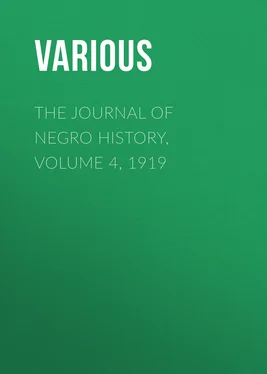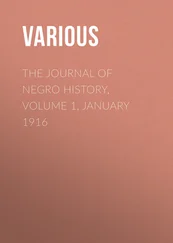Various - The Journal of Negro History, Volume 4, 1919
Здесь есть возможность читать онлайн «Various - The Journal of Negro History, Volume 4, 1919» — ознакомительный отрывок электронной книги совершенно бесплатно, а после прочтения отрывка купить полную версию. В некоторых случаях можно слушать аудио, скачать через торрент в формате fb2 и присутствует краткое содержание. Жанр: foreign_antique, periodic, История, foreign_edu, на английском языке. Описание произведения, (предисловие) а так же отзывы посетителей доступны на портале библиотеки ЛибКат.
- Название:The Journal of Negro History, Volume 4, 1919
- Автор:
- Жанр:
- Год:неизвестен
- ISBN:нет данных
- Рейтинг книги:5 / 5. Голосов: 1
-
Избранное:Добавить в избранное
- Отзывы:
-
Ваша оценка:
- 100
- 1
- 2
- 3
- 4
- 5
The Journal of Negro History, Volume 4, 1919: краткое содержание, описание и аннотация
Предлагаем к чтению аннотацию, описание, краткое содержание или предисловие (зависит от того, что написал сам автор книги «The Journal of Negro History, Volume 4, 1919»). Если вы не нашли необходимую информацию о книге — напишите в комментариях, мы постараемся отыскать её.
The Journal of Negro History, Volume 4, 1919 — читать онлайн ознакомительный отрывок
Ниже представлен текст книги, разбитый по страницам. Система сохранения места последней прочитанной страницы, позволяет с удобством читать онлайн бесплатно книгу «The Journal of Negro History, Volume 4, 1919», без необходимости каждый раз заново искать на чём Вы остановились. Поставьте закладку, и сможете в любой момент перейти на страницу, на которой закончили чтение.
Интервал:
Закладка:
If self-help applied under certain conditions within the blood kin as it unquestionably did, that is to say, within the law, it applied with greater force to all classes and offenders who were outside the blood kin and were outside the law. If a stranger or an alien came within the community bounds and did not sound his horn, community law sanctioned his instant killing by anyone who met him. Men could not peaceably enter the precincts of the German tribes as late as the year 500 or 600 A.D. without being liable to instant death unless they complied with certain definite formularies. Until within five hundred years, the stranger was practically without rights in any country but his own, and might be dealt with violently by individuals or bodies of citizens. One has but to remember the tortures visited upon the Jews in all European countries with impunity to realize the truth of the doctrine of self-help when applied to strangers. There was literally no law to govern the situation. The courts did not deal with it, no penalties were provided for the restraining of individuals or of the community at large, dealing with strangers until a relatively recent time.
Is it not true that the difference in blood between the Negro and the white man has caused a survival of this notion of self-help, today illogical, unreasonable, absurd, but powerful none the less despite its technical infraction of the law of the land? Is not the lynching of a Negro or of a white man simply the old primitive self-help with the hue and cry and the execution of the victim when caught by the mob or by the sheriff's posse? There is perhaps no field of speculation so fascinating as this of the survival of bygone customs, traditions, and notions, in present society. At the same time he will be a poor and uncritical student who will not recognize the ease of erecting vast structures upon slender foundations. My purpose in this article is not to allege the necessary truth of this proposition, but, if possible, to stimulate along different lines than has been common the researches of those who are interested in the psychological attitude of the white man toward the Negro.
There will be no doubt those who will exclaim that if I am right in this analysis of the problem—indeed, if there be any reasonable modicum of truth in what I say—then the solution of the problem will be difficult in the extreme. The whole method of attack upon it will be altered. A long educational campaign will become the main feature, intended to expose the true basis of the white man's denial of real equality to the Negro race. It will look like a battle too long to be waged with courage because the victory will be far in the future. I do not agree. The attack, if properly directed, and vigorously followed up, will, like the assault of the woman suffragists upon equally ancient instinctive promptings, be unexpectedly successful. The walls of the fortress are thin and the defenders the wraiths of a dim past.
Roland G. Usher.LINCOLN'S PLAN FOR COLONIZING THE EMANCIPATED NEGROES 1 1 Cf. Chapter XVII, Nicolay and Hay, Abraham Lincoln, a History .
The colonization of the emancipated slaves had been one of the remedies for the difficulties created by the presence of freedmen in the midst of slave conditions. The American Colonization Society was founded in 1816 with the object of promoting emancipation by sending the freedmen to Africa. Some of the slave States, moreover, had laws compelling the freedmen to leave the State in which they had formerly resided as slaves. With an increasingly large number securing legal manumission, the problem caused by their presence became to the slaveholding group a most serious one. The Colonization Society, therefore, sought to colonize the freedmen on the west coast of Africa, thus definitely removing the problem which was of such concern to the planters in slaveholding States.
The colony of Liberia, on the west coast of Africa, was chosen as a favorable one to receive the group of freed slaves. Branches of the Colonization Society were organized in many States and a large membership was secured throughout the country. James Madison and Henry Clay were among its Presidents. Many States made grants of money and the United States Government encouraged the plan by sending to the colony slaves illegally imported. But to the year 1830 only 1,162 Negroes had been sent to Liberia. The full development of the cotton gin, the expansion of the cotton plantation and the consequent rise in the price of slaves forced many supporters of both emancipation and colonization to lose their former ardor.
As the antebellum period of the fifties came on these questions loomed larger in the public view. The proposition for colonizing free Negroes grew in favor as the slavery question grew more acute between the sections. Reformers favored it, public men of note urged its adoption and finally, as the forensic strife between the representatives of the two sections of the country developed in intensity, even distinguished statesmen began to propose and consider the adoption of colonization schemes. 2 2 President Fillmore in his last message to Congress proposed a plan for Negro colonization and advocated its adoption. This part of his message was suppressed on the advice of his cabinet; but even had this not been done, there is no reason to suppose that the plan would have been adopted. President Buchanan made arrangements with the American Colonization Society for the transportation of a number of slaves captured on the slaver, Echo, in 1858.
Abraham Lincoln, as early as 1852, gave a clear demonstration of his interest in colonization by quoting favorably in one of his public utterances an oft-repeated statement of Henry Clay,—"There is a moral fitness in the idea of returning to Africa her children, whose ancestors have been torn from her by the ruthless hand of fraud and violence." 3 3 Eulogy on Henry Clay, delivered in the State House at Springfield, Illinois, July 16, 1852. The quotation here noted is taken from a speech by Henry Clay before the American Colonization Society, 1827. Lincoln continued: "If as friends of colonization hope, the present and coming generations of our countrymen shall by any means succeed in freeing our land from the dangerous presence of slavery, and at the same time in restoring a captive people to their long lost fatherland with bright prospects for the future, and this too so gradually that neither races nor individuals shall have suffered by the change, it will be a glorious consummation." The Works of Abraham Lincoln , Federal Edition, edited by A.B. Lapsley, VIII, pp. 173-174.
In popular parlance, however, Lincoln is not a colonizationist. He has become not only the Great Emancipator but the Great Lover of the Negro and promoter of his welfare. He is thought of, popularly always, as the champion of the race's equality. A visit to some of our emancipation celebrations or Lincoln's birthday observances is sufficient to convince one of the prevalence of this sentiment. Yet, although Lincoln believed in the destruction of slavery, he desired the complete separation of the whites and blacks.
Throughout his political career Lincoln persisted in believing in the colonization of the Negro. 4 4 "The political creed of Abraham Lincoln embraced among other tenets, a belief in the value and promise of colonization as one means of solving the great race problem involved in the existence of slavery in the United States.... Without being an enthusiast, Lincoln was a firm believer in Colonization." Nicolay and Hay, Abraham Lincoln—A History , VI, p. 354.
In the Lincoln-Douglas debates the beginning of this idea may be seen. Lincoln said: "If all earthly power were given me, I should not know what to do as to the existing institution. My first impulse would be to free all the slaves and send them to Liberia—to their own native land. But a moment's reflection would convince me that, whatever of high hope (as I think there is) there may be in this, in the long run its sudden execution is impossible. If they were all landed there in a day, they would all perish in the next ten days; and there are not surplus shipping and surplus money enough in the world to carry them there in many times ten days. What then? Free them all and keep them among us as underlings? Is it quite certain that this betters their condition? I think that I would not hold one in slavery at any rate, yet the point is not clear enough for me to denounce people upon. What next? Free them and make them politically and socially our equals? My own feelings will not admit of this, and if mine would, we well know that those of the great mass of whites will not. Whether this feeling accords with sound judgment is not the sole judgment, if indeed it is any part of it." 5 5 Speech at Peoria, Ill., in reply to Douglas. Life and Works of Abraham Lincoln , II, Early Speeches. Centenary Edition, edited by M.M. Miller. The Lincoln-Douglas Debates, October 16, 1854; p. 74.
Интервал:
Закладка:
Похожие книги на «The Journal of Negro History, Volume 4, 1919»
Представляем Вашему вниманию похожие книги на «The Journal of Negro History, Volume 4, 1919» списком для выбора. Мы отобрали схожую по названию и смыслу литературу в надежде предоставить читателям больше вариантов отыскать новые, интересные, ещё непрочитанные произведения.
Обсуждение, отзывы о книге «The Journal of Negro History, Volume 4, 1919» и просто собственные мнения читателей. Оставьте ваши комментарии, напишите, что Вы думаете о произведении, его смысле или главных героях. Укажите что конкретно понравилось, а что нет, и почему Вы так считаете.












